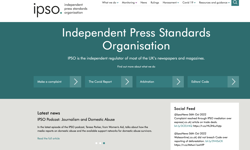
As reported on the Society of Editors website:
Ministers have added landmark new measures to the Bill to safeguard freedom of expression and democracy, ensuring necessary online protections do not lead to unnecessary censorship.
The draft legislation follows campaigns by the Society of Editors to ensure that journalistic content is exempt from the Bill. Publishers had previously stressed that determined efforts by the government should be made to ensure the digital platforms did not remove media content on their sites through the use of algorithms when adhering to the new regulations.
Figures show more than three quarters of UK adults are concerned about going online, and fewer parents feel the benefits outweigh the risks of their children being online – falling from 65 per cent in 2015 to 5 per cent in 2019.
The draft Bill includes changes to put an end to harmful practices, while protecting democratic debate, including:
- New additions to strengthen people’s rights to express themselves freely online, while protecting journalism and democratic political debate in the UK
- Further provisions to tackle prolific online scams such as romance fraud, which have seen people manipulated into sending money to fake identities on dating apps
- Social media sites, websites, apps and other services hosting user-generated content or allowing people to talk to others online must remove and limit the spread of illegal and harmful content such as child sexual abuse, terrorist material and suicide content
- Ofcom will be given the power to fine companies failing in a new duty of care up to £18 million or ten per cent of annual global turnover, whichever is higher, and have the power to block access to sites
- A new criminal offence for senior managers has been included as a deferred power. This could be introduced at a later date if tech firms don’t step up their efforts to improve safety.
The draft Bill will be scrutinised by a joint committee of MPs before a final version is formally introduced to Parliament.
The move comes only weeks after a boycott of social media by sports professionals and governing bodies in protest at the racist abuse of footballers online, while at the same time concerns continue to be raised at social media platforms arbitrarily removing content and blocking users.
In line with the government’s response to the Online Harms White Paper, all companies in scope will have a duty of care towards their users so that what is unacceptable offline will also be unacceptable online.
They will need to consider the risks their sites may pose to the youngest and most vulnerable people and act to protect children from inappropriate content and harmful activity.
They will need to take robust action to tackle illegal abuse, including swift and effective action against hate crimes, harassment and threats directed at individuals and keep their promises to users about their standards.
The largest and most popular social media sites (Category 1 services) will need to act on content that is lawful but still harmful such as abuse that falls below the threshold of a criminal offence, encouragement of self-harm and mis/disinformation. Category 1 platforms will need to state explicitly in their terms and conditions how they will address these legal harms and Ofcom will hold them to account.
The draft Bill contains reserved powers for Ofcom to pursue criminal action against named senior managers whose companies do not comply with Ofcom’s requests for information. These will be introduced if tech companies fail to live up to their new responsibilities. A review will take place at least two years after the new regulatory regime is fully operational.
The final legislation, when introduced to Parliament, will contain provisions that require companies to report child sexual exploitation and abuse (CSEA) content identified on their services. This will ensure companies provide law enforcement with the high-quality information they need to safeguard victims and investigate offenders.
However, the Bill will ensure people in the UK can express themselves freely online and participate in robust debate. All in-scope companies will need to consider and put in place safeguards for freedom of expression when fulfilling their duties. These safeguards will be set out by Ofcom in codes of practice but, for example, might include having human moderators take decisions in complex cases where context is important.
People using their services will need to have access to effective routes of appeal for content removed without good reason and companies must reinstate that content if it has been removed unfairly. Users will also be able to appeal to Ofcom and these complaints will form an essential part of Ofcom’s horizon-scanning, research and enforcement activity.
The largest social media sites will have additional duties. They will need to conduct and publish up-to-date assessments of their impact on freedom of expression and demonstrate they have taken steps to mitigate any adverse effects.
Ministers have added new and specific duties to the Bill for the largest social platforms to protect content defined as ‘democratically important’. This will include content promoting or opposing government policy or a political party ahead of a vote in Parliament, election or referendum, or campaigning on a live political issue.
Companies will also be banned from discriminating against particular political viewpoints and will need to apply protections equally to a range of political opinions, no matter their affiliation. Policies to protect such content will need to be set out in clear and accessible terms and conditions and firms will need to stick to them or face enforcement action from Ofcom.
When moderating content, companies will need to take into account the political context around why the content is being shared and give it a high level of protection if it is democratically important.
However, content on news publishers’ websites is not in scope. This includes both their own articles and user comments on these articles.
Articles by recognised news publishers shared on in-scope services will be exempted and Category 1 companies will now have a statutory duty to safeguard UK users’ access to journalistic content shared on their platforms.
This means they will have to consider the importance of journalism when undertaking content moderation, have a fast-track appeals process for journalists’ removed content, and will be held to account by Ofcom for the arbitrary removal of journalistic content. Citizen journalists’ content will have the same protections as professional journalists’ content.
Minister for Media and Data John Whittingdale said: “Protecting children and others from the darkest content online is our top priority with this history-making legislation, but by doing so we don’t want it to lead to a ‘woke web’ where legitimate journalism is censored by internet companies.
“That’s why we’ve built in safeguards so that content from news publishers will not be in scope of new laws, including content shared on social media platforms, and tech firms will need to factor in the crucial role of journalism as well as freedom of expression in their moderation decisions.
“A vibrant and free media is essential to our democracy and our Bill will make sure vital public interest journalism can reach its audience without interference, with Ofcom keeping a watchful eye on big tech firms to ensure their platforms remain open and impartial theatres of debate.”
Measures to tackle user-generated fraud will be included in the Bill. It will mean online companies will, for the first time, have to take responsibility for tackling fraudulent user-generated content, such as posts on social media, on their platforms. This includes romance scams and fake investment opportunities posted by users on Facebook groups or sent via Snapchat.
Dame Melanie Dawes, Ofcom Chief Executive, said: “Today’s Bill takes us a step closer to a world where the benefits of being online, for children and adults, are no longer undermined by harmful content.
“We’ll support Parliament’s scrutiny of the draft Bill, and soon say more about how we think this new regime could work in practice – including the approach we’ll take to secure greater accountability from tech platforms.”










